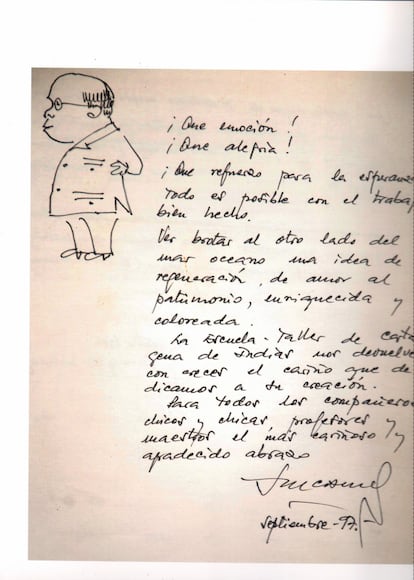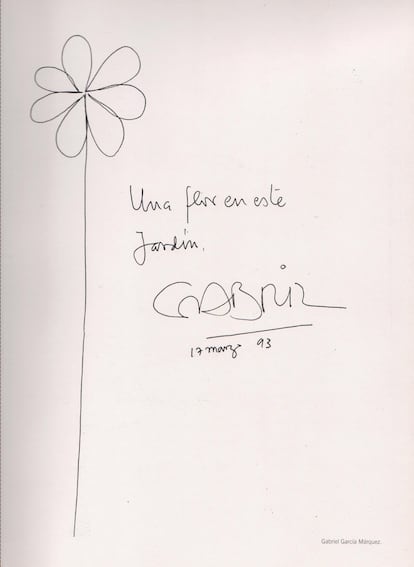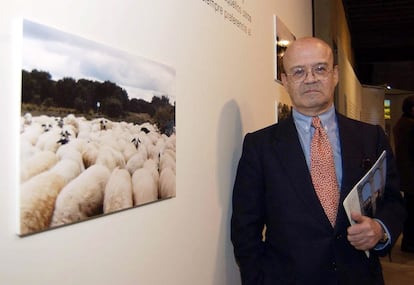The great Justin of Azcárate, familiarly linked to the free of teaching institution, joined Spanish cultural and political life upon exile in Venezuela and, after exercising as a senator and deputy, he was president of the Board of Trustees of the Prado Museum. When we first coincided, he told me jokingly: “You would love to meet a cousin named Julio. He is a curious, multifaceted and friendly activist: cartoonist, calligraphy and artist, in addition, he is ingenious, imaginative and very funny. A Segovian who had a professor to tender Galván when he studied Law at the University of Salamanca. He is the director of Fepma, a foundation for the protection of ecology and the environment of which I am president. He is now determined to safeguard the National Royal Cañadas Network, prepares a program for the preservation of the Cultural Heritage of Latin America and a study for the legal protection of the environment. I am sure you will congenize, you will become friends and that together you can undertake large companies. ”
What an eye Justino Azcárate had! And that his work Eduardo Aznar continued, because in September 1985, thanks to the push of Joaquín Almunia, at the time Minister of Labor, they started in the monastery of Santa María la Real de Aguilar de Campoo and San Benito el Real de Valladolid two Pilot projects for unemployed young people, to whom Potes, Reinosa and Llanes joined, starting the school-workshop program and trades houses that Carmen Romero was a great support as deputy and Julio Martín Casas an enthusiastic promoter and disseminator. For this, the Zero School implemented, based in Fepma itself, which was crucial to give the impulse that the project needed before the INEM assumed it as its own.
Based on the “Learning and making learning” principle, the workshop schools became the main active employment policy of the socialist government for unemployed young people and were co -financed since its inception by the INEM and the European Social Fund. They were not a care program but existential. Young people intended to recover, recover trades and recover assets by carrying out collective utility works. As the theory and practice are needed for learning, instead of proposing subjects, the workshop school, following the ORA and LABORA Benedictine, provides training and paid work, facing the challenge of rehabilitating cultural and natural heritage in disuse. Learning and labor insertion were the natural consequence of this initiative to which Julio dedicated half of his life, not only in Spain, but also in most Latin American countries.

He did it when in 1992 the Spanish Agency for Development Cooperation (AECID) incorporated the workshop schools to its heritage recovery program in cities such as León, Ciudad Bolívar, San Juan and Ponce de Puerto Rico, Santiago de Chile, Asunción, Joao Pessoa , Quito, Potosí, Havana, Lima, Cuzco, La Antigua, Cartagena de Indias, Popayán, Mompox, Bogotá, San Salvador de Bahía, Puebla, Oaxaca, Managua; Many of them World Heritage Cities.
The catalog will record this Workshop schools and trades houses. A contribution to heritagewhich edited by the INEM and the European Social Fund (FSE) and prepared by Martín, and also the book Workshop schools, peace tools in Colombiawhich under the direction of Luis Villanueva was published in October 2010 by AECID.

In the latter, the Minister of Culture, Mariana Garcés Córdoba, recognizes the importance of the program: “The work carried out by the workshop schools already occupies an important place within the cultural history of Colombia. Since 1992 they have established themselves as the main safeguarding centers of traditional trades. There are many rehabilitated public buildings and spaces, recovered traditional trades and teachers who have transmitted the secrets of techniques, to know how to do and the ethics of the trade to young people. By doing so, they have shown us that cultural heritage is not the issue of a few, but we all have to work on their protection and safeguard. Its principles of social inclusion have reaffirmed that culture can be a life option for all citizens, regardless of their origin or economic situation, or have disabilities or that have lived in their own flesh the social problems that our country has faced In recent years. Therefore, the Ministry of Culture has endorsed the National Workshop Schools of Colombia: Peace tools that will have a significant impact on the reconstruction of life projects and the generation of local capacities, also in strengthening confidence in ourselves. They will teach us that culture can change our life, can make us more humans and we can thus build a more inclusive nation where culture becomes that peace tool that today’s workshop schools are today. ”
40 years have passed since the school-workshops began their career and we had cited Julio and I to contribute our granite to the celebration of such a faust event, but he did not go to the appointment because he died on February 13, 2025, to the 87 years, in Madrid. It can rest in peace because few have done as much as he for half a century for an abandoned heritage, for an abused environment and for hundreds of thousands of young people without expectations.

